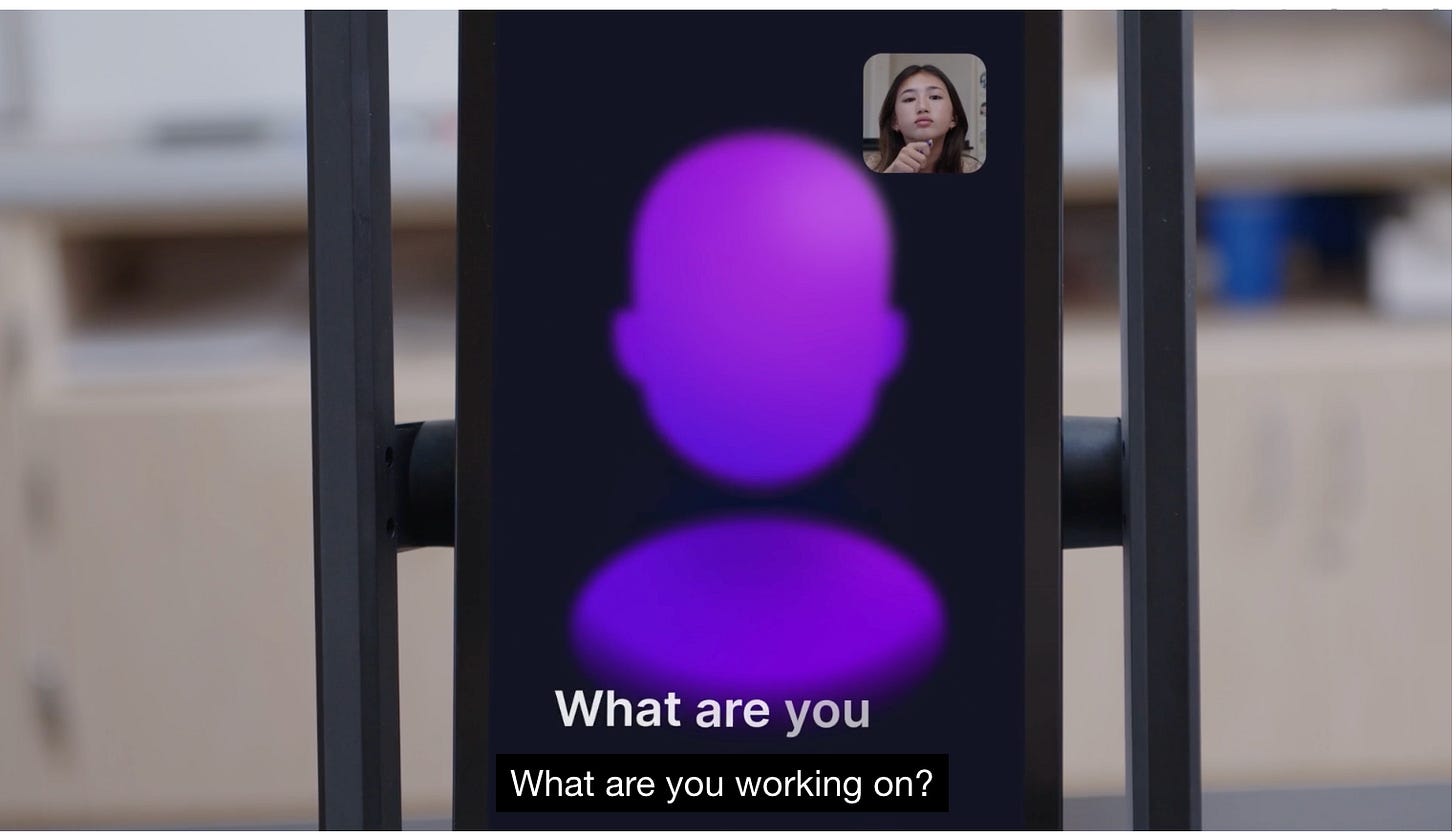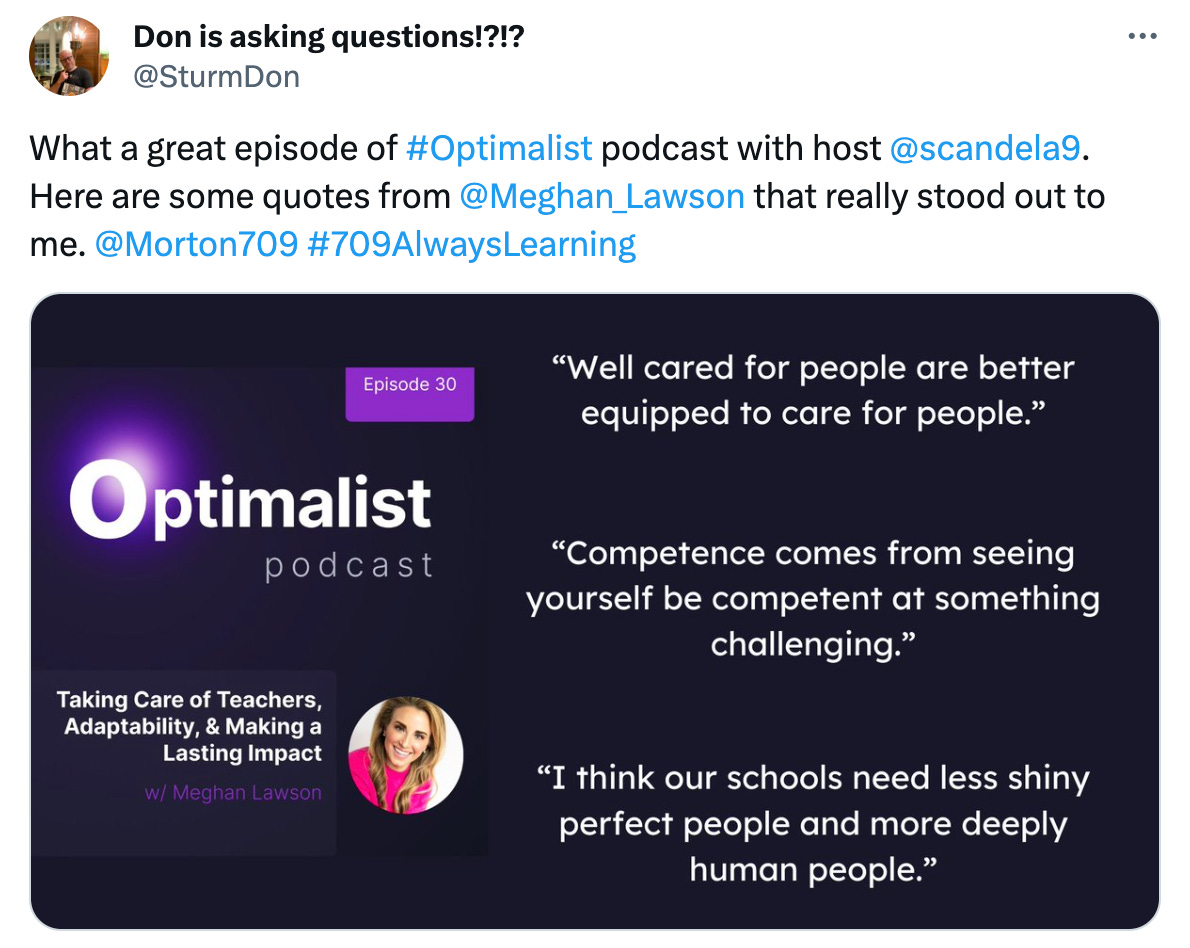The Potential of Reflection
Strengthening this loop on our thinking holds a whole lot of potential
“Can we take a moment to reflect?”
This statement is a normal thing for people to say, and not just in education. You hear it in any medium where people talk. And we say this because it mirrors how our minds work. We don’t just think, we think in loops. We think, act, and feel, and we think about our thinking, actions, and feelings.
And while it is a normal thing to say, educators and therapists figured out a long time ago that making it a conversation and structuring how we reflect improves our potential. Add in some prompts or questions, try to make it a daily routine, or add it as a routine built around learning experiences.
It is also thought of as a skill. That’s why it’s often called a reflective practice.
If we can learn to narrate our actions, examine the results of them, explore our feelings about our experiences, and envision what the future could look like - it’s transformational. Our self-awareness and our motivation advance exponentially.
But structured reflection isn’t yet a routine for most of us. It’s just too time consuming and relatively unenjoyable to do (ie, journaling). And it’s clearly not a skill we possess at scale yet. Of course, people still think in loops because that’s how our minds work. Some of those loops are bound to be constructive - but many are not. We ruminate, self-criticize, procrastinate, and make bad decisions that leave us out of alignment with who we want to be.
This is what has us thinking about how to make the experience of reflection automated and more enjoyable with Mirror, and socializing reflection for educators with Reflectivity.
And this also has us thinking: what might be possible if there were radically more and better reflection in education? What if we produced radically better reflective skills as an outcome?
Here are some of the potentials we’ve been pondering:
Learning acceleration: Educators already know that reflection improves outcomes. It’s been established in a wide variety of studies. But what educators also know is that they do not have enough time to maximize reflection’s potential - especially with each individual student. Removing the time barrier standing in the way of reflection is all that is necessary to unlock this potential. The only thing we don’t know, is just how far this potential can take us.
Future Proof Assessment: AI detectors don’t work. This, plus the astonishing capabilities of AI, tempt students to take shortcuts and cheat. This is starting to make assessment harder than ever. On the other end of the challenge, educators will have to aim even higher to produce the skills that maintain our comparative advantage. And these new skills create new assessment needs and challenges. In both cases, shifting the basis of assessment to the reflection can help, as educators are already figuring out. From a reflection, you can determine if work was done or shortcuts were taken. You can also assess highly complex, rapidly changing skills. Reflection could be the future-proof way to assess all learning.
Make Grading Obsolete: Extrinsic motivators like grades have always been necessary for our system of education to function. But we all dream of a system that doesn’t rely on them - we want a system that fosters true intrinsic motivation to drive results. What we’ve always been missing is a strong enough feedback loop on students thinking to build the self awareness and ownership of goals they need to do it. There isn’t enough time, and perhaps even enough educator skill, to teach each student how to order their experience within the constraints of school - to help them find what motivates them beyond simplistic, pre-existing interest. But now this is possible. And with it, moving past traditional grading might finally be possible.
Address Mental Health Crisis: The mental health crisis is widespread, at all ages. And it has made SEL initiatives a top priority for schools. There are a range of methods being employed leveraging mindfulness and therapeutic practices. The results however have been mixed. Strengthened reflective practice isn’t often cited as part of the solution. But we think this is an oversight. Reflection is the link between social-emotional and cognitive development. And that link could be the missing link, so to speak, in addressing the mental health crisis. Instead of treating mental health separately from the things that motivate and create meaning for us, reflection integrates it.
Goal Alignment: You may have heard of “the alignment problem” in the debate about AI. This speaks to the challenge of making sure AI does positive things for us and doesn’t harm, or in the extreme, destroy civilization. This is most often thought of as an engineering problem when making or testing AI systems. But AI mostly just does what we ask it to do. And the reality is that what makes goal alignment so hard is that WE are not aligned, within ourselves, our families and communities. What we need for things with AI to go well is people who are goal-aligned themselves. And reflection should be thought of as the ‘original act’ of goal alignment. This is likely why it produces the outcomes it does in classrooms, by aligning the goals of students and teachers. And prioritizing greater skill of reflection can help educators contribute to this important societal challenge.
More Adaptable, Optimistic People: The pace of change in society is accelerating, and it will become less and less optional to keep up. To live well will need to be more adaptable than ever. But change, for people, is hard. When change is required, it leads to resistance and the kind of pessimism that holds valuable progress back for everyone. The skill of reflection can help everyone develop the self-awareness and goals they need to stay adaptable and optimistic for the path ahead.
Address Ignorance: There are a lot of takes on the roots of ignorance, and it fuels a lot of incredibly unproductive debate about education - thinking that it’s always some lack of skill or knowledge that wasn’t taught. But the Dunning Kruger effect has already shown us that a lack of self-awareness is what really fuels ignorance. It’s not just some missing skill or knowledge; it’s the lack of awareness of them - the disconnect between one’s internal narrative and the external world. And for whatever reason we just haven’t connected the dots to reflection as the mechanism to improve it. Now is the time.
More Adaptable Organizations: The rate of change in the world affects companies and institutions just as much as people. Those that adapt will survive and those that don’t will go obsolete. And that likely includes some institutions we would never consider could go obsolete. I think its fair to say that no organization can think of themselves as immune. One of the best ways to enable adaptability and organizational thriving is by basing the culture of the organizations in which we work, in reflection. As it turns out, the skills needed to flourish in the workplace are actually the skills that make us the most human.
Develop Future Work Skills: The future of work is nearly impossible to predict. But that doesn’t mean we shouldn’t try. In fact, it’s imperative that we do try. We know the future will be nothing like today, and it’s better to be wrong in the interest of being less wrong soon. So here’s a prediction - the future of jobs will be: 1) doing a rapidly shrinking set of non-automatable tasks, 2) giving goals to automated tools that require no special skills or knowledge to run, and 3) reflecting on what you did to refine the goals - either individually or as a team.
Put more directly, individual and group reflection might just be the only skill that we can say will be required of future jobs.
Thriving in a Post-Job World: We might be getting a bit science-fiction-y with this one. But it is worth considering that the not-so-distant future might not include jobs for humans. Technology could do all the work once it gets intelligent and agentic enough. If true, to be healthy and happy we’ll need to find the motivation to grow and develop ourselves and not get consumed by our consumption. And reflection can be the mechanism that helps everyone live optimally.
What potential do you see? Is there anything you’d like to see us explore in a follow-up post? Drop us a note in comments, or even on Twitter by using the tag #Optimalist when you post!
The Optima List
The best possible list of opportunities
🤖 Introducing Mirror by Swivl
One week ago, we announced the launch of Mirror - a tool that uses AI to automate reflection in order to align classroom goals and develop even higher order skills.
The act of reflection possesses an untapped potential that can unlock new levels of human growth and development if practiced at a deeper and more regular pace. At Swivl, we build tools to realize this potential in schools… and beyond.
Mirror is where students (and you!) meet their potential self.
See full details - as well as how to WIN a device! - by clicking the button. And consider sharing with other educators and colleagues. We’d love to know your first impressions, as well as partner with you to develop this transformational tool.
And don’t forget that we are continuing to help educators adapt to using AI in the classroom with our ongoing AI Webinar Series. Check out recordings of sessions from earlier this fall, and register for future sessions here.
In the Podcast World…
💡Swivl Co-Founder & Co-CEO, Brian Lamb, on My EdTech Life Podcast
This week, Brian joined Alfonzo Mendoza to discuss Mirror, our new AI-driven tool reshaping classroom experiences through automated reflection, engaging calls, and interactive visual activities. This is a great opportunity to discover its seamless integration with Google Classroom, steadfast dedication to data security, and the upcoming new web and mobile app. Listen for an insightful conversation which puts Mirror into context within Swivl’s place in edtech history. Thank you!
🎙️ Meghan Lawson Impresses in the Latest Optimalist Podcast
This week on the podcast, Sara talked with Meghan Lawson, a former ELA teacher and author of the new book "Legacy of Learning: Teaching for Lasting Impact." Throughout this conversation, Meghan emphasizes the importance of experiences in developing passions and shares insightful quotes from people she admires or draws inspiration from. They discuss Meghan’s own journey into education and how it grew into a deeper passion for the profession. Among what Meghan values, is the belief in creating meaningful experiences for both students and staff, ultimately empowering them to make a lasting impact.
🗣️ What people are saying about this episode:
Key reflection: What about yourself do only others usually see? Post your answer in the comments and be entered to win 1 of 5 copies of Meghan’s book. You can also answer by adding to this Twitter/X thread.
You can listen to Meghan’s episode at the Spotify player below, right here in our Substack, or anywhere else you like to listen to podcasts.








As a former teacher who often struggled to relate to her students due to demographics and educational background, I can say with certainty this worked:
"And reflection should be thought of as the ‘original act’ of goal alignment. This is likely why it produces the outcomes it does in classrooms, by aligning the goals of students and teachers. And prioritizing greater skill of reflection can help educators contribute to this important societal challenge."
When my students understood and could articulate well what my objectives were for their learning, they not only became more connected to our learning community, but were more passionate about the content. They also more actively contributed to our classroom dialogue when we set goals for ourselves for the future.